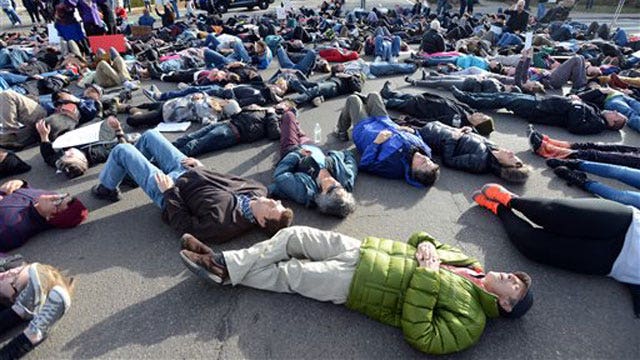Poll: Voters agree with Brown jury, disagree with Garner
Fair and balanced panel reacts to Fox News polling
Two grand juries recently declined to charge white police officers in connection with the deaths of unarmed black men. Americans think one was right and the other wrong.
That’s according to the latest Fox News poll.
Click here for the poll results.
Commentators and others have understandably linked the decisions coming in quick succession out of Ferguson, Missouri and New York City. Yet voters apparently see key distinctions between the two cases.
By a 22-point margin, they agree with the grand jury decision in Ferguson, Missouri not to seek criminal charges against a white police officer in the shooting death of a black teenage robbery suspect (55 percent agree vs. 33 percent disagree).
The reverse is true for the grand jury decision in New York: by 30 points, most disagree with the decision not to seek criminal charges against a white officer in the chokehold death of a black man stopped for selling loose cigarettes (27 percent agree vs. 57 percent disagree).
Large majorities of black voters disagree with the decisions in Ferguson (83 percent) and New York (90 percent). For white voters, a majority agrees with the decision in Ferguson (65 percent), while just over half disagree with the outcome in New York (51 percent).
Democrats disagree with both the Ferguson (59 percent) and New York (74 percent) decisions. Republicans think the grand jury made the right decision in Ferguson (77 percent). On the decision in New York, Republicans have mixed views: 40 percent agree, 37 percent disagree and 23 percent are unsure.
These grand jury decisions have provoked protests in cities nationwide that are continuing days after the decisions were announced. Nearly 4 in 10 think news coverage of the protests has been “about right” (39 percent).
Others think the news favors one side: by a 25-point margin, voters are more likely to say the coverage has been too supportive of the protestors (37 percent) than to say it’s been too supportive of the police (12 percent).
Some say the refusal of large segments of society to believe a jury’s findings in such cases is a solvable problem -- police should wear body cameras. It’s a proposal pretty much everyone can get behind: 85 percent like the idea of police being required to wear them. That includes most blacks (90 percent), whites (84 percent) and Hispanics (85 percent).
There is also agreement across party lines, as large numbers of both Democrats (89 percent) and Republicans (79 percent) favor body cameras for police.
Meanwhile, voters are nearly three times as likely to say race relations have gotten worse (62 percent) rather than better (19 percent) since Barack Obama became president. Another 17 percent say things are the same.
Majorities of white (65 percent), black (55 percent) and Hispanic voters (56 percent) say race relations have gotten worse under Obama.
Overall, Obama receives a 41 percent approval rating for the job he’s doing on race relations, while 51 percent of voters disapprove. Despite the negative rating, that makes this one of his best issues.
Sixty-five percent of black voters approve of Obama’s performance on race relations, down from 82 percent approval in 2010. Twenty-four percent disapprove.
Among white voters, 37 percent approve and 56 percent disapprove.
These numbers help explain why, overall, just 19 percent of voters think Obama should get more involved personally in cases like Ferguson, while nearly half -- 48 percent -- say he should be less involved. Nearly a third feels Obama’s actions in the recent cases have been “about right” (31 percent).
Black voters (35 percent) are more than twice as likely as white voters (15 percent) to say Obama should get more involved personally.
The issue of race relations comes in at the bottom of things voters want Obama to work on right now: 38 percent say working on the economy should be his top priority, while 21 percent say terrorist groups like ISIS. Another 12 percent say health care, 10 percent immigration and 9 percent race relations.
The Fox News poll is based on landline and cell phone interviews with 1,043 randomly chosen registered voters nationwide and was conducted under the joint direction of Anderson Robbins Research (D) and Shaw & Company Research (R) from December 7-9, 2014. The full poll has a margin of sampling error of plus or minus three percentage points.










































